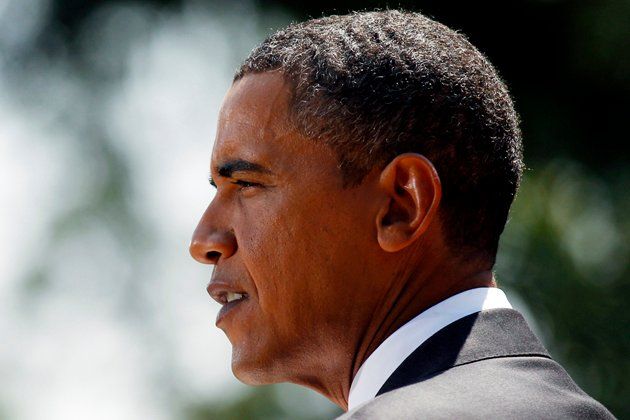
In his speech to the nation Tuesday night, Barack Obama will try to make the seven-and-a-half-year conflict he once called a "dumb war" sound a lot smarter. He will try to turn social chaos into rhetorical order, to make America's ill-fated incursion into Iraq seem like it's at the beginning of the end when it's really closer to the end of the beginning. Obama will try to map a politically driven withdrawal schedule—the Aug. 31 deadline he is proudly meeting by drawing down to a remaining 50,000 "noncombat" troops—onto a fractured nation that is operating on a whole other schedule, if it can be called a schedule at all.
Obama is doing the best he can with what he's got—probably the best that anyone can—but nonetheless all of this amounts to putting a presidential imprimatur on a national delusion. The president will be careful to say that the transition from "Operation Iraqi Freedom" to "Operation New Dawn" does not mean "Mission Accomplished." But his speech is still likely to mask, from Americans, the deeper reality of what is happening in Iraq. If there is indeed a new Iraq growing up—and that idea by itself is still wishful thinking—it is growing up around the U.S. presence. The new Iraq will remain as dependent on the U.S. military as a severely disabled child. The Iraqi Constitution is, like postwar Japan's, an American import, a set of Western concepts grafted onto a still-alien culture that could take generations to come around. The Iraqi military and security forces can't operate without U.S. support. The disputes over boundaries between the Kurds, Sunnis, and Shiites are largely unresolved. There is simply no getting around the little-noted corollary to Colin Powell's infamous "Pottery Barn" rule: it's not just that if you break a country you own it; it's that you never really stop owning it. This is even true of other countries we have "broken" in wars and then remade, ones that were a lot further along in development and social stability like Japan and South Korea, both of which continue to host substantial numbers of U.S. troops today.
Things are not nearly as bad in Iraq now as they were in 2006, when I was last there, and a similar stalemate prevented the creation of an Iraqi government (the Iraqis needed to "get governing," George W. Bush kept saying with exasperation). But then, as now, there was really only one cohering force in the country: the American presence. And then, as now, even with vastly improved conditions (the lack of an all-out sectarian war, a dramatically reduced Qaeda presence despite the recent spate of attacks), there is very little evidence that Iraq can hold together without the glue America provides—in security, in politics, in Iraq's very sense of national identity. This isn't going to be a model of democracy. Instead it's more likely to be—if it works out—a new model for post-Cold War colonialism, albeit a colonialism that dare not speak its name. Substantial numbers of U.S. troops will almost certainly be necessary well beyond the deadline of the end of 2011, a presence that any new Iraqi government, if it manages to come into being, will almost certainly be happy to approve. If that does happen, former U.S. ambassador to Iraq Ryan Crocker writes in Tuesday's Washington Post, "I hope we will listen."
The question is whether, with his speech, the president is adequately preparing the American people for this eventuality. I fear not. As Crocker, who knows the region as well as anybody, writes: The "Washington clock" is running "much faster than the Baghdad clock." And "our lack of strategic patience is something that, over time, our adversaries have come to count on and our allies to fear—in Lebanon, Iraq, Afghanistan and Pakistan."
The sad thing for Obama is that he predicted this outcome as well as anyone—certainly better than his "peers" in Washington, or the Republicans who are savaging him every day. "I don't oppose all wars," Obama said as a state senator in his famous speech back in 2002. "What I am opposed to is a dumb war. What I am opposed to is a rash war ... I know that even a successful war against Iraq will require a U.S. occupation of undetermined length, at undetermined cost, with undetermined consequences ... You want a fight, President Bush? Let's finish the fight with bin Laden and Al Qaeda."
But Bush didn't, and now Obama has to. Another thing that Obama will try to do in his speech Tuesday night is to permanently shift the nation's attention to Afghanistan, all without noting that the imbroglio there is a direct outgrowth of the feckless shift of attention and resources to Iraq in 2003. The Taliban were allowed to grow strong again through sheer inattention by the Bush administration. When it comes to the economy or the financial system, Obama has continued to heap blame on his predecessor. But on this issue the president can't take the same tack, because it would be seen as an insult to the brave men and women who fought—and often sacrificed lives and limbs—in Iraq. So this too remains subtext.
Obama hasn't been helped at all, of course, by the fact that almost no one else talks about the strategic mistake of invading Iraq. The majority of our punditocracy, the great and good of American journalism, cannot to this day bring themselves to admit they were wrong about Iraq, that they had no idea what they were saying and writing when they backed the invasion. That they vastly underestimated the job in Afghanistan even while they vastly overestimated America's ability to finish the job in Iraq. That they were the dumb backers of that very dumb war, and they are still blithely opining on our editorial pages—this time on why Obama can't seem to get it right. Obama is all alone on this. And on Tuesday he will be all alone in trying to set it right from the Oval Office.
Uncommon Knowledge
Newsweek is committed to challenging conventional wisdom and finding connections in the search for common ground.
Newsweek is committed to challenging conventional wisdom and finding connections in the search for common ground.
About the writer
To read how Newsweek uses AI as a newsroom tool, Click here.








